Advertisements
Online Mock Tests
Chapters
2: Physics and Mathematics
3: Rest and Motion: Kinematics
▶ 4: The Forces
5: Newton's Laws of Motion
6: Friction
7: Circular Motion
8: Work and Energy
9: Centre of Mass, Linear Momentum, Collision
10: Rotational Mechanics
11: Gravitation
12: Simple Harmonics Motion
13: Fluid Mechanics
14: Some Mechanical Properties of Matter
15: Wave Motion and Waves on a String
16: Sound Waves
17: Light Waves
18: Geometrical Optics
19: Optical Instruments
20: Dispersion and Spectra
21: Speed of Light
22: Photometry
![HC Verma solutions for Concepts of Physics Vol. 1 [English] Class 11 and 12 chapter 4 - The Forces HC Verma solutions for Concepts of Physics Vol. 1 [English] Class 11 and 12 chapter 4 - The Forces - Shaalaa.com](/images/9788177091878-concepts-of-physics-vol-1-english-class-11-and-12_6:46896509a13743528b4d5729ac982f47.jpg)
Advertisements
Solutions for Chapter 4: The Forces
Below listed, you can find solutions for Chapter 4 of CBSE, Karnataka Board PUC HC Verma for Concepts of Physics Vol. 1 [English] Class 11 and 12.
HC Verma solutions for Concepts of Physics Vol. 1 [English] Class 11 and 12 4 The Forces Short Answers [Page 61]
A body of mass m is placed on a table. The earth is pulling the body with a force mg. Taking this force to be the action what is the reaction?
A boy is sitting on a chair placed on the floor of a room. Write as many action-reaction pairs of forces as you can.
A lawyer alleges in court that the police had forced his client to issue a statement of confession. What kind of force is this ?
When you hold a pen and write on your notebook, what kind of force is exerted by you on the pen? By the pen on the notebook? By you on the notebook?
Is it true that the reaction of a gravitational force is always gravitational, of an electromagnetic force is always electromagnetic and so on?
Suppose the magnitude of Nuclear force between two protons varies with the distance between them as shown in figure. Estimate the ratio "Nuclear force/Coulomb force" for
(a) x = 8 fm
(b) x = 4 fm
(c) x = 2 fm
(d) x = 1 fm (1 fm = 10 −15m).
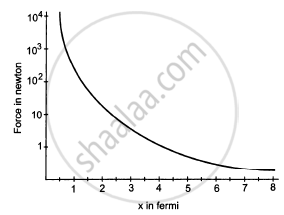
List all the forces acting on the block B in figure.
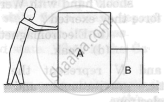
List all the forces acting on (a) the pulley A, (b) the boy and (c) the block C in figure.
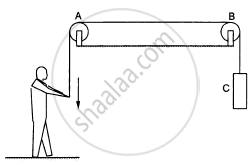
Figure shows a boy pulling a wagon on a road. List as many forces as you can which are relevant with this figure. Find the pairs of forces connected by Newton's third law of motion.
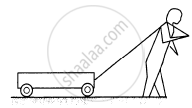
Figure shows a cart. Complete the table shown below.
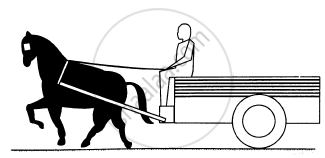
| Force on | Force by | Nature of the Force | Direction |
| Cart |
1 |
||
| Horse |
1 |
||
| Driver |
1 |
HC Verma solutions for Concepts of Physics Vol. 1 [English] Class 11 and 12 4 The Forces MCQ [Page 62]
When Neils Bohr shook hand with Werner Heisenberg, what kind of force they exerted ?
Gravitational
Electromagnetic
Nuclear
Weak.
Let E, G and N represent the magnitudes of electromagnetic gravitational and nuclear forces between two electrons at a given separation. Then
N>E>G
E>N>G
G>N>E
E>G>N
The sum of all electromagnetic forces between different particles of a system of charged particles is zero
only if all the particles are positively charged
only if all the particles are negatively charged
only if half the particles are positively charged and half are negatively charged
irrespective of the signs of the charges
A 60 kg man pushes a 40 kg man by a force of 60 N. The 40 kg man has pushed the other man with a force of
40 N
0 N
60 N
20 N
HC Verma solutions for Concepts of Physics Vol. 1 [English] Class 11 and 12 4 The Forces MCQ [Page 62]
A neutron exerts a force on a proton which is
(a) gravitational
(b) electromagnetic
(c) nuclear
(d) weak
A proton exerts a force on a proton which is
(a) gravitational
(b) electromagnetic
(c) nuclear
(d) weak
Mark the correct statements :
(a) The nuclear force between two protons is always greater than the electromagnetic force between them.
(b) The electromagnetic force between two protons is always greater than the gravitational force between them.
(c) The gravitational force between two protons may be greater than the nuclear force between them.
(d) Electromagnetic force between two protons may be greater than the nuclear force acting between them.
If all matters were made of electrically neutral particles such as neutrons,
(a) there would be no force of friction
(b) there would be no tension in the string
(c) it would not be possible to sit on a chair
(d) the earth could not move around the sun.
Which of the following systems may be adequately described by classical physics ?
(a) motion of a cricket ball
(b) motion of a dust particle
(c) a hydrogen atom
(d) a neutron changing to a proton.
The two ends of a spring are displaced along the length of the spring. All displacement have equal magnitudes. In which case or cases the tension or compression in the spring will have a maximum magnitude ?
(a) the right end is displaced towards right and the left end towards left
(b) both ends are displaced towards right
(c) both ends are displaced towards left
(d) the right end is displaced towards left and the left end towards right.
Action and reaction
(a) act on two different objects
(b) have equal magnitude
(c) have opposite directions
(d) have resultant zero.
HC Verma solutions for Concepts of Physics Vol. 1 [English] Class 11 and 12 4 The Forces Exercise [Page 63]
The gravitational force acting on a particle of 1 g due to a similar particle is equal to 6.67 × 10−17 N. Calculate the separation between the particles.
Calculate the force with which you attract the earth.
At what distance should two charges, each equal to 1 C, be placed so that the force between them equals your weight ?
Two spherical bodies, each of mass 50 kg, are placed at a separation of 20 cm. Equal charges are placed on the bodies and it is found that the force of Coulomb repulsion equals the gravitational attraction in magnitude. Find the magnitude of the charge placed on either body.
A monkey is sitting on a tree limb. The limb exerts a normal force of 48 N and a frictional force of 20 N. Find the magnitude of the total force exerted by the limb on the monkey.
A body builder exerts a force of 150 N against a bullworker and compresses it by 20 cm. Calculate the spring constant of the spring in the bullworker.
A satellite is projected vertically upwards from an earth station. At what height above the earth's surface will the force on the satellite due to the earth be reduced to half its value at the earth station? (Radius of the earth is 6400 km.)
Two charged particles placed at a separation of 20 cm exert 20 N of Coulomb force on each other. What will be the force of the separation is increased to 25 cm?
The force with which the earth attracts an object is called the weight of the object. Calculate the weight of the moon from the following data : The universal constant of gravitation G = 6.67 × 11−11 N−m2/kg2, mass of the moon = 7.36 × 1022 kg, mass of the earth = 6 × 1024 kg and the distance between the earth and the moon = 3.8 × 105 km.
Find the ratio of the magnitude of the electric force to the gravitational force acting between two protons.
The average separation between the proton and the electron in a hydrogen atom in ground state is 5.3 × 10−11 m. (a) Calculate the Coulomb force between them at this separation. (b) When the atom goes into its first excited state the average separation between the proton and the electron increases to four times its value in the ground state. What is the Coulomb force in this state?
The geostationary orbit of the earth is at a distance of about 36000 km from the earth's surface. Find the weight of a 120-kg equipment placed in a geostationary satellite. The radius of the earth is 6400 km.
Solutions for 4: The Forces
![HC Verma solutions for Concepts of Physics Vol. 1 [English] Class 11 and 12 chapter 4 - The Forces HC Verma solutions for Concepts of Physics Vol. 1 [English] Class 11 and 12 chapter 4 - The Forces - Shaalaa.com](/images/9788177091878-concepts-of-physics-vol-1-english-class-11-and-12_6:46896509a13743528b4d5729ac982f47.jpg)
HC Verma solutions for Concepts of Physics Vol. 1 [English] Class 11 and 12 chapter 4 - The Forces
Shaalaa.com has the CBSE, Karnataka Board PUC Mathematics Concepts of Physics Vol. 1 [English] Class 11 and 12 CBSE, Karnataka Board PUC solutions in a manner that help students grasp basic concepts better and faster. The detailed, step-by-step solutions will help you understand the concepts better and clarify any confusion. HC Verma solutions for Mathematics Concepts of Physics Vol. 1 [English] Class 11 and 12 CBSE, Karnataka Board PUC 4 (The Forces) include all questions with answers and detailed explanations. This will clear students' doubts about questions and improve their application skills while preparing for board exams.
Further, we at Shaalaa.com provide such solutions so students can prepare for written exams. HC Verma textbook solutions can be a core help for self-study and provide excellent self-help guidance for students.
Concepts covered in Concepts of Physics Vol. 1 [English] Class 11 and 12 chapter 4 The Forces are Introduction of Work, Energy and Power, Notions of Work and Kinetic Energy: the Work-energy Theorem, Work Done by a Constant Force and a Variable Force, Concept of Work, Conservation of Mechanical Energy, Potential Energy of a Spring, Various Forms of Energy : the Law of Conservation of Energy, Power, Collisions, Non - Conservative Forces - Motion in a Vertical Circle, Kinetic Energy (K), Potential Energy (U).
Using HC Verma Concepts of Physics Vol. 1 [English] Class 11 and 12 solutions The Forces exercise by students is an easy way to prepare for the exams, as they involve solutions arranged chapter-wise and also page-wise. The questions involved in HC Verma Solutions are essential questions that can be asked in the final exam. Maximum CBSE, Karnataka Board PUC Concepts of Physics Vol. 1 [English] Class 11 and 12 students prefer HC Verma Textbook Solutions to score more in exams.
Get the free view of Chapter 4, The Forces Concepts of Physics Vol. 1 [English] Class 11 and 12 additional questions for Mathematics Concepts of Physics Vol. 1 [English] Class 11 and 12 CBSE, Karnataka Board PUC, and you can use Shaalaa.com to keep it handy for your exam preparation.
